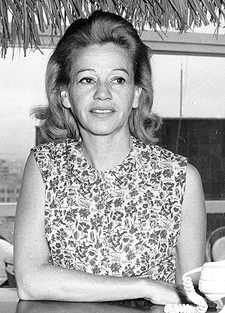Elena Garro (Elena Garro)

Elena Garro was born to a Spanish father and a Mexican mother on December 11, 1916 in Puebla, Mexico. Frequently, Elena Garro is said to have been born in 1920, but that is wrong. (Hand Written Original Birth Certificate recorded February 7, 1917, says “11 Diciembre de PROX. Pasado,” which means Dec. 11, 1916: She spent her childhood in Mexico City but moved to Iguala, Guerrero, during the Cristero War. She studied literature, choreography and theater in the National Autonomous University of Mexico in Mexico City, where she was an active member of Julio Bracho’s theatre group. While she lived in Mexico City she met Octavio Paz, whom she married in 1937. They had one daughter, Helena Laura Paz Garro. She turned her love of the theatre to writing plays. Most of her works have been produced abroad, and many were printed many years after she had written them. Elena Garro and Octavio Paz were supposed to be divorced in 1959. Elena Garro declared she never divorced Octavio Paz and, if such a document exists, a fraudulent divorce document was created-(Personal conversation with Elena Garro in 1997 with Patricia Rosas Lopategui and Casey Reed, wherein Elena Garro declared that no formal document of her divorce with Octavio Paz with Elena Garro’s signature exists.) According to her final will, Elena died believing she was not legally divorced. After the 1968 Tlatelolco Massacre, she accused certain Mexican intellectuals of being responsible of instigating the students and later abandoning them. These accusations caused resentment in the intellectual community who repudiated her. In 1972, Garro left the country and lived in exile in France for twenty years.
When Elena Garro returned to Mexico in 1994 she lived in Cuernavaca . She suffered from lung cancer due to her heavy smoking and Consejo Nacional para la Cultura y las Artes (CONACULTA) covered her medical expenses. She later died from this illness. Her work touches on the themes of the marginalization of women and racism. Most important was her criticism of the Mexican government. She also portrayed a critical vision of the Mexican Revolution (1910) in her master novel “Los recuerdos del porvenir” (1963), which was awarded the Xavier Villarutia Prize, and which has been translated into several languages. Her novel “Y Matarazo no llamó . . . ” criticizes how the government used excessive force to stop the labor strike. In her short story, “La culpa es de los tlaxcaltecas,” she vindicates la Malinche. Her play “Felipe Angeles” is a documentary drama where she resurrects the General Felipe Angeles, a revolutionary leader who was executed in 1919 by the government of Venustiano Carranza] against the will of the people. This was a result of his success in saving the lives of many people in Chihuahua, when Pancho Villa ordered the execution of one hundred soldiers. He is also known for his triumph in Zacatecas. Angeles fought against the dictatorship of Porfirio Díaz with Francisco Madero, president of Mexico who was also assassinated.
Born
- December, 11, 1916
- Puebla, Mexico
Died
- August, 22, 1998
- Cuernavaca, Mexico
Cause of Death
- lung cancer



